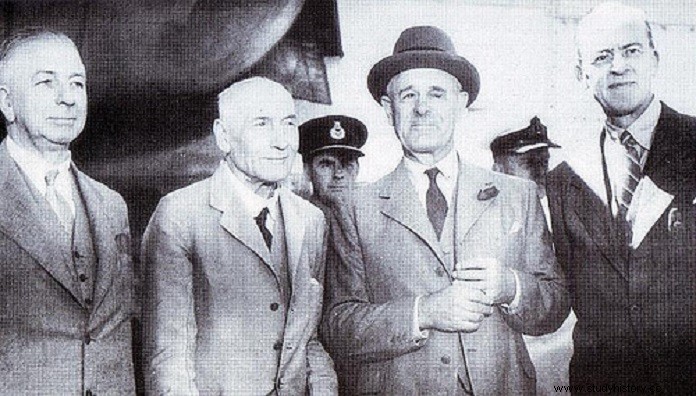
Jinnah's Na……!
On July 10, 1946, Jawaharlal Nehru told reporters in a press conference that- "Congress is not bound by agreements and it is ready to face any situation as it has been doing till now." It is…….
The Muslim League interpreted Nehru's statement to mean that the Congress would amend the plan once it gained power. Therefore Jinnah called a meeting of the Muslim League on 27 July itself. Jinnah told them that- 'Nehru has gone back on his promise made before the Cabinet Mission. So now he had to decide on the steps that can be taken in the new situation.' First Liaquat Ali read each proposal aloud and then the discussion on them started which went on for two days.
Sir Firoz Khan Noon urged- 'It would be better if we openly confess our mistake which we have committed by accepting the Sangh as envisioned by the plan of the mission. We must return to our ideal of Pakistan.'
Maulana Hasrat Mohani got up amidst loud sloganeering and said almost screaming - 'The wisdom lies in the complete rejection of constitutional proposals. There is only one path of light that can show us the path of light and that is a separate state of fully sovereign Pakistan. It is too late for Quaid-e-Azam to say, Muslims of India will raise the flag of rebellion in a moment.'
Other maulanas, khans and mullahs also reiterated similar views. Raja Ghazanfar Ali promised- 'If Mr. Jinnah gives voice, then Muslims from all walks of life will go ahead and jump into the struggle to get Pakistan.
After listening to the opinion of the council, Jinnah and his working committee presented two resolutions on 29 July 1946. Through the first resolution, the League withdrew its acceptance of the Mission's May proposals, and through the second, further direct action was set for.
Since Muslim-India is tired of trying, but it has not been able to achieve a peaceful solution to the Indian problem by compromise and constitutional means, because the Congress, in collusion with the British, established the rule of upper caste Hindus in India. Since recent developments have proved that Indian issues are decided on the basis of politics of power and not on the basis of honesty and justice, since it is now completely clear that India's Muslims will no longer rest in peace without the establishment of a free and fully sovereign state of Pakistan
, The time has come for the Muslim-nation to claim their rights by taking direct action to achieve Pakistan. Defend your pride, get rid of the existing slavery of the British and the suspicion of upper caste Hindu-dominance.
After both the resolutions were passed, Jinnah concluded- 'We have taken a very historic decision. Since the formation of the Muslim League, we have not taken any step other than through constitutional means and constitutional dialogue. Today we are going to take this step because of the combined moves of Congress and Britain. We are being attacked from two fronts.
……. Today we have said our last salute to the constitutions and constitutional methods. The two sides with whom we were negotiating kept pistols at us throughout the negotiations. Behind the pistol of one were power and machine guns and behind the pistol of the other there was a threat to launch a non-cooperation and civil disobedience movement. We have to face this situation. We also have a pistol.'
Thus the Muslim League canceled its acceptance of the Cabinet Mission Plan and announced direct action to obtain Pakistan. In this declaration it was said that- 'From today we separate by statutory means.……. Today we have prepared a weapon for ourselves and are in a position to use it. '
The cabinet plan was rejected by the Muslim League as well as some other political elements. Maulana Abul Kalam Azad remarked on Nehru's statement that- 'The mistake of 1946 proved to be very costly.
Jinnah made a public statement- 'All these facts have proved without any doubt that Pakistan is the only solution to India's problem. Till Congress and Mr. Gandhi will continue to claim that he represents the whole country…… till then he will continue to deny the true reality and the absolute truth that the only authoritative organization of Muslims is the Muslim League and as long as he continues to move in this diplomatic circle, neither will anyone. There can be no compromise, nor can there be any freedom.
…… now that Mr. Gandhi has started speaking the language of the advisor to the whole world. They say that Congress……. Trustee of the people of India. We have got a lot of experience with this trustee for the last 150 years. We don't want Congress to be our trustee. We have grown up now. Muslims have only one trustee and that is the Muslim nation.' Jinnah also selectively targeted members of the Cabinet Mission.
He accused Cripps of- 'Cripps evasively evading the confines of the simple definition of mission goals in the House of Commons. For this he resorted to juggling of words and misled the House. I am sorry that the Cripps corrupted his legal talent.'
Jinnah accused Paitak Lawrence, another member of the Cabinet Mission, of 'he had said in the House of Lords that Jinnah could not monopolize the representation of Muslims. I am no trader. I am not asking for concessions for oil. Nor am I bargaining and bargaining like a beggar.'
